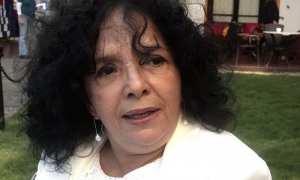I already had the password; it was three rings, pause, and then two more. Otherwise, she would not open the gate of Tirry 81. The 1970's were hard for her and for many intellectuals and artists. That's a piece of cake, but a stale one. Faced with the immense wall of misunderstandings, the only salvation was to live your piece of life. Neither she nor I plunged into the viscous sadness. Carilda had come back from many grievances, prejudices and disdain for the transgressive way she decided to stand up to the provincial world.
We decided to get together and visit her. We were a bizarre group, there was adventure in us. The Hershey train left Havana in the morning and arrived in Matanzas in the afternoon. We were few, not so happy, not so unhappy, not totally unhappy. But we were and we loved her because she was a lascivious angel and a great poetess. Her time was the time of our youth. And we were not going to let her be stolen from us.
She is Tirry 81 and her name is already an eponym. She had no opulent godparents because she was baptized in the San Juan River by Macorina and Papa Montero. She is Carilda because no one else can be called Carilda. And we would go to visit her on long afternoons and early mornings with tea because there was not enough coffee. I don't know what the bohemia of books was like, that of Toulouse-Lautrec or Amedeo Modigliani in the Montmartre of the late 19th century. But I knew Tirry 81's bohemia, I felt it, I embraced it and I would not change it for any other. A bohemia that she enjoyed with her young husband Felix, the tenor who collected daggers, swords and handmade necklaces, who loved the dozens of cats in the house like she did and another tenor, the canary Caruso, with yellowish feathers and unbearable trills. Felix's mother, Mariita, made tea and told us amazing stories. She could watch color television when it only existed in black and white. And she would talk to Chopin and the Virgin Mary, who were her soul protectors. Carilda and I would read our poems, while Ramiro Guerra, in a courtyard of ferns and dieffenbachia, would play sarabande solos until dawn. In those Matanzas feasts the evils of the spirit were dissipated, and we breathed a clean air that served as breath to return to Havana the next day on the train from Hershey.
Carilda is the multiplication of her own being because she cannot be equaled to anything. She opened the doors to Cuban neo-romantic poetry by the hand of Emilio Ballagas and José Ángel Buesa. She was everyone's girlfriend. She wrote her political poems with a devastating lyricism. She is an impudent, hurricane-like wind. She has lived poetry in flesh and blood. She is unclassifiable, gunpowder and asbestos, shamelessly and toothed, playing not to lose the light in the last minute. She surrenders daily to herself and no one else. She is a nymph of trauma, professional of phosphorus, cursed, blessed, as beautiful as a tulip, as graceful as a grassquit, as scandalous as a firecracker in the middle of a sacristy, like her legend to which she has surrendered with flamboyant lightness and complicit modesty.
She is explicable neither in exegesis nor in discernment. She is colloquial, surrealist, modernist and futurist and avant-garde. She could have been killed with banal praise and sweetened adjectives, but she did not let herself be defeated. She knew how to separate the wheat from the chaff. And she came out undefeated like Sappho, Gertrudis Gómez, Luisa Pérez de Zambrana and Fina García-Marruz.
She is the unrestrained and profuse expression of all the chimeras dreamed by the women of her time. She is the pinnacle of a radiant flowering of poetesses who fell by the wayside because they took the sidewalk and dressed in fashion. And they were devoured by their own ennui, while she wrote poems south of her throat. She is a lascivious angel and a social theorem. She is a saffron imp, a phoenix risen from the ashes.
She is a shred of the earth, her grandmother's and hers, which is Cuba, and she is Nirvana and Zen, next to Zenea and Plácido, Heredia and Milanés.
Carilda, we are here because you are with us daily in that fiction that is time. You have not died. Do not ask us for a space to be with you. You are the deep, unfathomable space where so many would like to be. You are the unfading time of our youth.
Translated by ESTI






